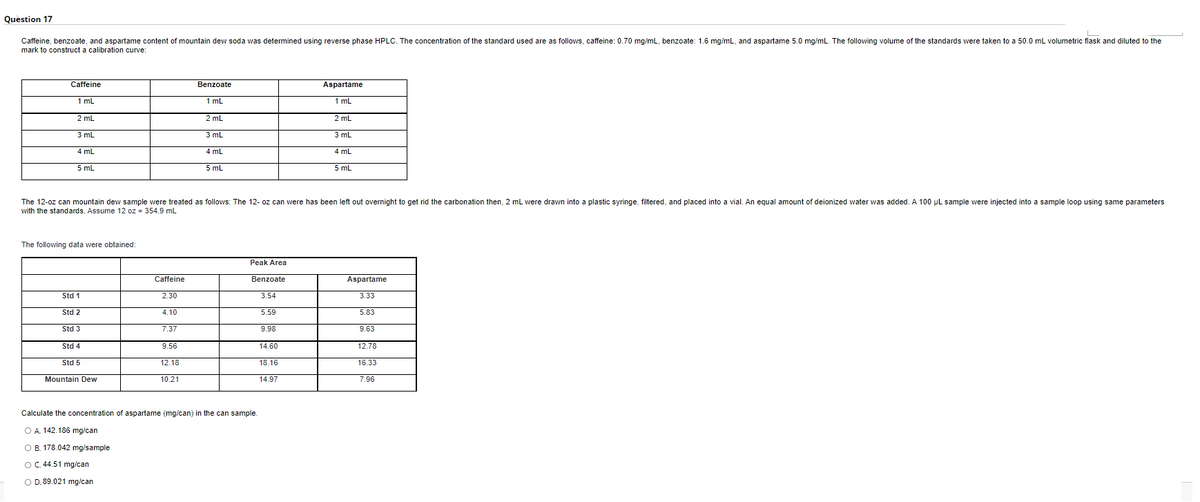Question 17 Caffeine, benzoate, and aspartame content of mountain dew soda was determined using reverse phase HPLC. The concentration of the standard used are as follows, caffeine: 0.70 mg/mL, benzoate: 1.6 mg/mL, and aspartame 5.0 mg/mL. The following volume of the standards were taken to a 50.0 mL volumetric flask and diluted to the mark to construct a calibration curve: Caffeine Benzoate Aspartame 1 mL 1 mL 1 mL 2 mL 2 mL 3 mL 3 mL 3 mL 4 mL 4 mL 4 mL 5 mL 5 ml 5 mL The 12-oz can mountain dew sample were treated as follows: The 12- oz can were has been left out overnight to get rid the carbonation then, 2 mL were drawn into a plastic syringe, filtered, and placed into a vial. An equall amount of deionized water was added. A 100 μL sample were injected into a sample loop using same parameters with the standards. Assume 12 oz - 354.9 mL The following data were obtained Peak Area Benzoate Caffeine Aspartame Std 1 2.30 3.54 3.33 Std 2 4.10 5.59 5:59 5.83 Std 3 7.37 9.98 9.63 Std 4 9.56 14.60 12.78 Std 5 12.18 18.16 16.33 Mountain Dew 10.21 14.97 7.96 Calculate the concentration of aspartame (mg/can) in the can sample. O A 142.186 mg/can OB. 178.042 mg/sample OC. 44.51 mg/can O D.89.021 mg/can 2 mL
Question 17 Caffeine, benzoate, and aspartame content of mountain dew soda was determined using reverse phase HPLC. The concentration of the standard used are as follows, caffeine: 0.70 mg/mL, benzoate: 1.6 mg/mL, and aspartame 5.0 mg/mL. The following volume of the standards were taken to a 50.0 mL volumetric flask and diluted to the mark to construct a calibration curve: Caffeine Benzoate Aspartame 1 mL 1 mL 1 mL 2 mL 2 mL 3 mL 3 mL 3 mL 4 mL 4 mL 4 mL 5 mL 5 ml 5 mL The 12-oz can mountain dew sample were treated as follows: The 12- oz can were has been left out overnight to get rid the carbonation then, 2 mL were drawn into a plastic syringe, filtered, and placed into a vial. An equall amount of deionized water was added. A 100 μL sample were injected into a sample loop using same parameters with the standards. Assume 12 oz - 354.9 mL The following data were obtained Peak Area Benzoate Caffeine Aspartame Std 1 2.30 3.54 3.33 Std 2 4.10 5.59 5:59 5.83 Std 3 7.37 9.98 9.63 Std 4 9.56 14.60 12.78 Std 5 12.18 18.16 16.33 Mountain Dew 10.21 14.97 7.96 Calculate the concentration of aspartame (mg/can) in the can sample. O A 142.186 mg/can OB. 178.042 mg/sample OC. 44.51 mg/can O D.89.021 mg/can 2 mL
Chapter7: Statistical Data Treatment And Evaluation
Section: Chapter Questions
Problem 7.25QAP
Related questions
Question

Transcribed Image Text:Question 17
Caffeine, benzoate, and aspartame content of mountain dew soda was determined using reverse phase HPLC. The concentration of the standard used are as follows, caffeine: 0.70 mg/mL, benzoate: 1.6 mg/mL, and aspartame 5.0 mg/mL. The following volume of the standards were taken to a 50.0 mL volumetric flask and diluted to the
mark to construct a calibration curve:
Caffeine
Benzoate
Aspartame
1 mL
1 mL
1 mL
2 mL
2 mL
2 mL
3 mL
3 mL
3 mL
4 mL
4 mL
4 mL
5 mL
5 mL
5 mL
The 12-oz can mountain dew sample were treated as follows: The 12- oz can were has been left out overnight to get rid the carbonation then, 2 mL were drawn into a plastic syringe, filtered, and placed into a vial. An equal amount of deionized water was added. A 100 μL sample were injected into sample loop using same parameters
with the standards. Assume 12 oz = 354.9 mL
The following data were obtained:
Caffeine
Peak Area
Benzoate
3.54
Aspartame
Std 1
2.30
3.33
Std 2
4.10
5.59
5.83
Std 3
7.37
9.98
9.63
Std 4
9.56
14.60
12.78
Std 5
12.18
18.16
16.33
Mountain Dew
10.21
14.97
7.96
Calculate the concentration of aspartame (mg/can) in the can sample.
O A. 142.186 mg/can
OB. 178.042 mg/sample
O C. 44.51 mg/can
O D. 89.021 mg/can
Expert Solution
This question has been solved!
Explore an expertly crafted, step-by-step solution for a thorough understanding of key concepts.
Step by step
Solved in 2 steps with 2 images

Knowledge Booster
Learn more about
Need a deep-dive on the concept behind this application? Look no further. Learn more about this topic, chemistry and related others by exploring similar questions and additional content below.Recommended textbooks for you

